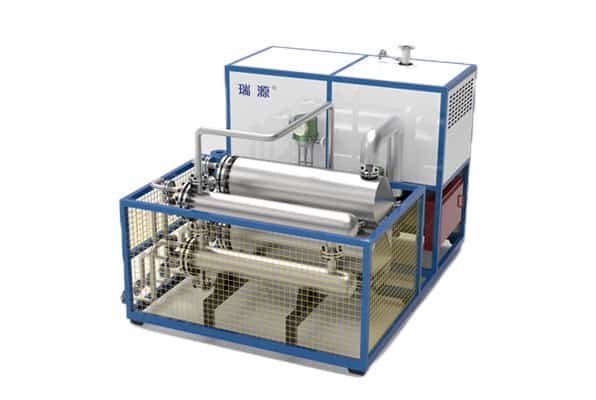In modern industrial heating, electric thermal fluid heaters https://8ruiyan.com/en/all-organic-heat-carrier-boilers/are a top choice for many industries. They are efficient, eco-friendly, and offer precise temperature control. These heaters use electricity to heat thermal oil, which then transfers heat through a circulation system. They are widely used in chemical, plastic, food processing, and other industries. However, with so many types available, choosing the right one can be challenging. This article explains the types, features, and applications of thermal oil heaters to help you make an informed decision.

How Electric Thermal Fluid Heaters Work and Their Advantages
An electric thermal fluid heater uses electricity to heat thermal oil (like mineral or synthetic oil). A pump circulates the hot oil to equipment that needs heat. This allows for indirect heating. Key advantages include:
- High efficiency: Converts electricity to heat with over 95% efficiency.
- Eco-friendly and safe: No combustion process, zero emissions.
- Precise temperature control: Ideal for temperature-sensitive processes.
- Stable operation: Closed-loop system reduces oxidation and extends life.
These benefits make thermal oil heaters a better choice than traditional coal or gas boilers.
Main Types of Electric Thermal Fluid Heaters
Based on design, power, and usage, these heaters can be divided into several types:
- Vertical Thermal Fluid Heaters
- Features: Compact vertical design, saves space. Ideal for small areas. Power range: 10-500 kW. Good for small to medium heating needs.
- Advantages: Easy to install, low maintenance, fast heating.
- Disadvantages: Limited power options due to smaller size.
- Horizontal Thermal Fluid Heaters
- Features: Horizontal layout, larger internal space. Power can exceed 1000 kW. Suitable for large industrial systems.
- Advantages: Large heat exchange area, high efficiency, good for continuous operation.
- Disadvantages: Takes up more space, higher initial cost.
- Explosion-Proof Thermal Fluid Heaters
- Features: Designed for hazardous environments (e.g., chemical, oil industries). Equipped with explosion-proof components and safety valves. Meets ATEX standards.
- Advantages: High safety, reduces explosion risks.
- Disadvantages: Higher cost, requires regular safety checks.
- Modular Thermal Fluid Heaters
- Features: Modular design allows flexible power and capacity adjustment. Ideal for production lines with varying demands.
- Advantages: Scalable, energy-efficient, reduces waste.
- Disadvantages: Complex system, requires skilled installation.
- High-Temperature Thermal Fluid Heaters
- Features: Made for high-temperature processes (e.g., reactor heating). Operating temperature can exceed 350°C. Uses high-temperature synthetic thermal oil.
- Advantages: Excellent high-temperature performance, good for precision processes.
- Disadvantages: Requires high-quality thermal oil, needs frequent maintenance.
Applications of Different Electric Thermal Fluid Heaters
Each type suits different industries and scenarios:
- Vertical Thermal Fluid Heaters
Best for: Small factories, labs, plastic injection molding machines, printing equipment. Examples: mold heating in plastics, small drying lines in food processing.
Why choose: Saves space, good for intermittent or small-scale production. - Horizontal Thermal Fluid Heaters
Best for: Large chemical plants, textile dyeing, rubber product lines. Examples: continuous heating for reactors in chemical plants, heat supply for textile setting machines.
Why choose: High power and stability for continuous operation. - Explosion-Proof Thermal Fluid Heaters
Best for: Petrochemical, pharmaceutical, and paint plants in hazardous areas. Examples: insulation for oil and gas pipelines, heating flammable solvents in pharmaceuticals.
Why choose: Safety-certified, prevents accidents. - Modular Thermal Fluid Heaters
Best for: Seasonal production, new energy battery lines, building materials processing. Examples: drying processes in lithium battery manufacturing, adjustable power based on output.
Why choose: Flexible and energy-saving, adapts to production changes. - High-Temperature Thermal Fluid Heaters
Best for: Advanced chemical processes, composite material molding, aerospace component testing. Examples: high-temperature curing in composite production.
Why choose: Precise high-temperature control for accurate results.
How to Choose the Right Heater
Consider these factors when selecting an electric thermal fluid heater:
- Power and capacity: Calculate the required power based on heat load. Avoid over- or under-sizing.
- Working environment: Choose explosion-proof for hazardous areas; vertical for limited space.
- Temperature needs: High-temperature processes require specialized models and quality thermal oil.
- Efficiency and cost: Modular types save energy but need higher initial investment.
- Maintenance and service: Regularly clean and replace thermal oil. Choose a reliable brand for good support.
summary
There are many types of thermal oil heaters. Each type fits specific applications. Understand your needs and use this guide to select the best equipment. This will improve your production efficiency and safety. For more help, contact a professional supplier for a custom solution!
Whatsapp:86-19106101570
wechat:86-19106101570
email:fob@jsryan.com
